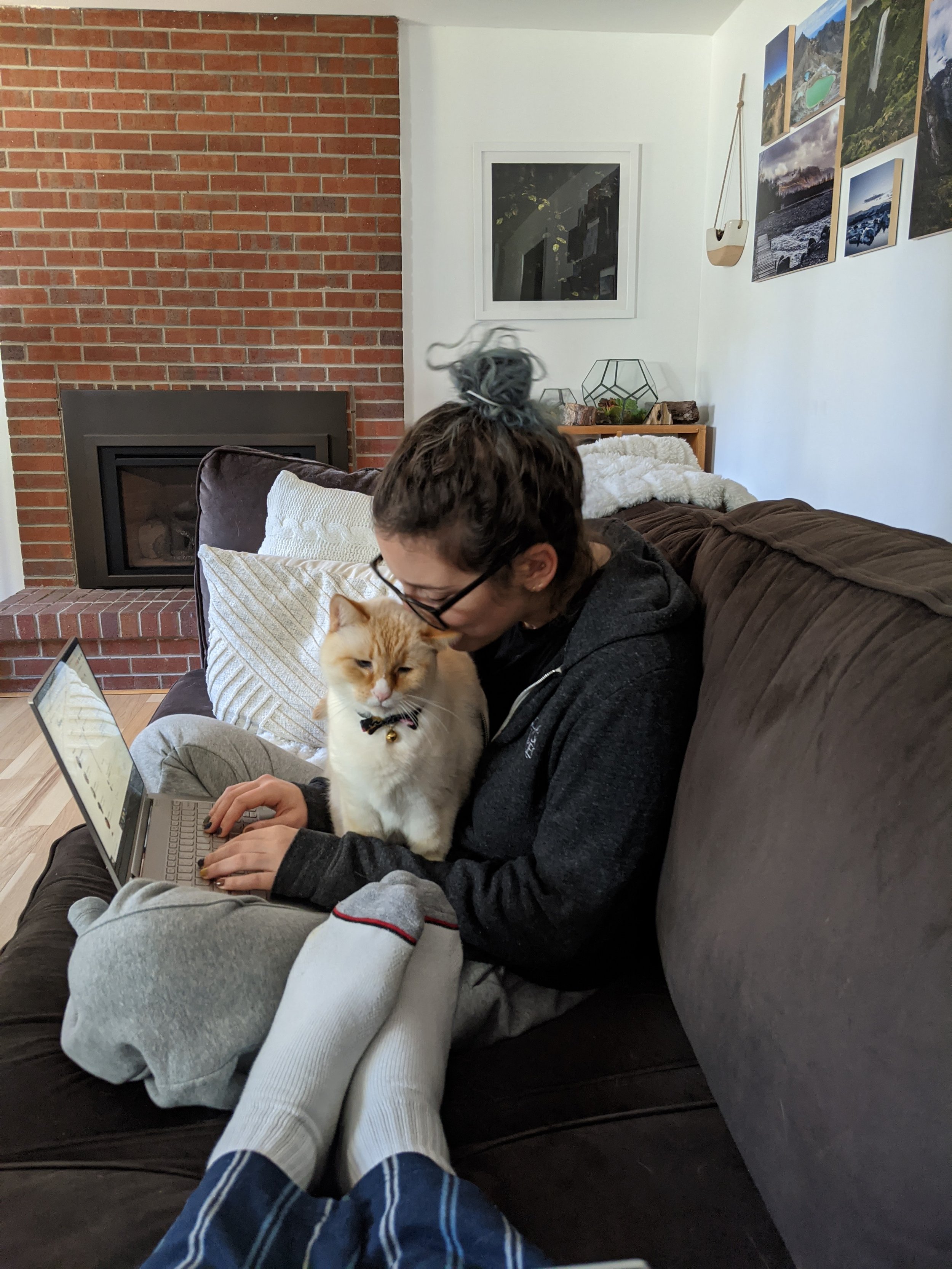When Crises Hits, Leadership Calls
The view from the window at my parent’s house, during an overnight break from the hospital during the ICU crises.
In February 2020, after several years of her fighting and managing stage 4 Lymphoma/Leukemia, I was sitting with my mother in the ICU in Albany, NY. I had flown out after receiving an emergency call in the middle of our standard Friday team meeting from my father unlike any of the ones I’ve had previously. He was sobbing - didn’t know if she would make it. Her legs had suddenly stopped working - he carried her to the car and drove her to the hospital, hours away. Then everything started crashing. She was intubated, medical coma. No one knew what was wrong - all the tests they were running showed nothing wrong with her, but she continued to worsen. We spoke with hospice.
We stayed in the ICU for a long time. I think maybe a week, and then another week in a different part of the hospital. A heavy dose of steroids eventually pulled her out of it, and I learned a new word - Cytokine Storm. An autoimmune condition that can kill you in almost no time at all.
At the same time, COVID had started to become more of a threat. No one knew what was happening, people were dropping dead. It was months before I heard the word Cytokine Storm in relation to the condition, but I locked myself away. I instilled heavy duty COVID protocols for our home that were beyond what most of our friends would, or could, do.
And all at the same time, I had a business to run. A business with almost 80 employees, 2 upcoming launches (an etirely new product line and massive website update). We couldn’t move every employee or department into remote work and continue to run the business. There was wildly fluctuating guidance on how to keep people safe, and very few supplies to distribute. I was personally and professionally panicking. I couldn’t just shut down the business and leave people without jobs. I also understood that asking people to risk their lives to make hair color was well outside the bounds of what I could morally justify.
In the first week of lockdown, our CFO sat down with us. We had seen rapidly decreasing sales over a few days after lockdown was announced, and didn’t know if it would continue. We ran through contingency layoffs, talked about sudden changes in supply chain (everything was being diverted to medical needs, could we even get supplies? should we?), talked about hazard pay, immediate shift to remote work, and more. And then he said an impactful and life changing statement:
Working remotely with my Chief Morale Officer, Toby the cat, and my husband.
“The team needs to hear from you.”
I was tired, confused, and felt totally unequipped. What could I possibly say to the team that they didn’t know on their own? I wasn’t an expert in epidemiology, I didn’t know how long this would last, or what would happen to the company. How was there anything to say to them that wouldn’t make it worse?
He added, “You’re the leader. What you say matters, and you need to speak to them.”
And so while we initiated emergency marketing content (ASMR style videos of conditioner mixing which spawned the very now well known “mix your hair color with palette knives trend”), started to try and figure out where to get masks, initiated more protocols for handwashing, figured out a per-employee budget for a remote work set up stipend, and saw our sales turn around, and then 1x, and then 5x, and then 12x seemingly overnight - I also started to plan out weekly founder video messages to the team about COVID, what we knew, what we didn’t know, and how we were going to proceed through it all.
This was one of many Culture Quakes we managed through, and it taught me several valuable lessons:
Running a people first business means caring about a lot of things all the time from a place of genuine empathy, with rock solid boundaries, and a commitment to finding the way through and pulling together.
Lesson 1: Our private and professional spheres are inherently connected - what our job is, the company we work for, the leader we have, and the place we live all have monumental impact on our individual agency and ability. Therefore - what’s private impacts the professional, and vice versa.
Politics, work life, and business are closely linked - For example, The American Civil Liberties Act, Griswold vs Connecticut, and The Americans With Disabilities Act had massive impact on who was allowed to work where and why. When there are huge swings, disruption should be expected across employees lives, supply chain, workflow, automations, and more. The line between personal lives and work is blurrier than ever - a 24/7 news cycle plus the increase of remote work contributes to the blending of these spaces. Stress, anxiety, and division around the news should be expected.
All teams rely on trust to ensure success and alignment. Trust is built on shared beliefs and values, with action taken regularly that reinforces those beliefs and values.
It is hard for people to do their best work when they feel at risk or in danger, or if they’re uncertain whether the place where their pour their time and energy is a place that values their safety and humanity. This is within your power, as a leader, to help fix, even if you can’t solve the thing that’s making them feel unsafe.
What to do:
Your employees want to hear that the company cares about them through destabilizing cultural events. Leaders have an opportunity to create some stability and trust. Make a company wide statement about what’s happening, relating it back to company mission/vision/values. Explain any pivots that may need to be made as a result. Listen to individual employee concerns, and reflect those conversations in your decision making (whether you use their suggestions or not, make sure you explain your logic).
Lesson 2: When the world changes, your company will change. Letting it happen by accident and not codifying or checking whether the changes are in alignment with your core values is an avoidable accident. Help employees see they can trust you and your word by revisiting your policies often and making sure that behaviors and policies are aligned with the values you say are critical to the business.
When the world changes, so can best practices. We’re accustomed to this in so many ways - for example, just look to how many businesses are eager to create efficiencies and adjust their business models to incorporate AI technologies, or remote work during the pandemic - however there can be resistance to adjusting your business around cultural shockwaves.
One of the most critical ways that employees can see you walk your walk is through ensuring that corporate values are present and alive throughout the company - and as culture shocks disturb the water, it’s important to reflect on the values and check them against critical place of employee engagement, policy being one. For example - if remote work is the way of the future, and you have a core value of work/life balance - how will you use policy and culture to help employees manage the new balance? How will you hold managers accountable to work hours? How will you create rituals and systems that help people adapt?
What to do:
Review your handbook. Is there anything in there that is contradictory to your stated values? Or anything missing that should be there? How can you tap into your team’s fears, concerns, and desires with the changing tides, and where can you appropriately address them in your policy? Once you make changes, make sure you announce them to the team, provide documentation, and train managers on the changes. Don’t just visit it once - change takes time and patience to establish in a company. Be consistent, and show people you’re serious.
Lesson 3: You don’t need to be a geopolitical expert or become an academic in the field of the change overnight - you just need to distill down what matters for the company and the people in it, and lead everyone in processing that information.
Truly, it does feel absolutely unfair to be trying to scale a business and then somehow be thrust into the role of “provider of stability for a group of people around geo-political issues that I cannot impact.”
It’s important to remember the impact you as a leader play in the lives of your employees. You control their livelihood, their access to capitol, and have impact on their career. Your decisions through crises, down to how you treat them and their concerns, not only carry weight, but heavy consequence for them as individuals and for the company overall.
Leadership is a heavy burden. It can feel impossible to know what to say or do to provide an emotional foundation so that your team can complete their work and pivot their way through crises. This a skillset you can develop, and a critical one in today’s always-on environment.
What to do:
Recognize that your job isn’t to solve the culture changing event for people, but to recognize that it’s happening, it has impact, and to point out where and how it collides with your values. Let your team know you’re human, and how collectively, the company will see it through. Helping the team re-align around what matters at work, how the company is impacted by what’s happening around it, and how their work matters will be grounding and aligning for everyone - you included.
Want more practical help? I co-wrote a WHOLE training on this specific thing. Get it for free (with others!) here. Look for “Communicating During a Culture Quake”

